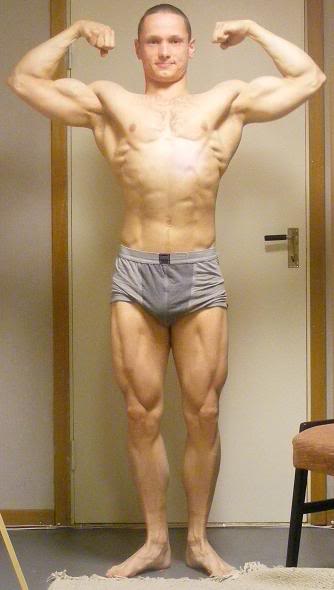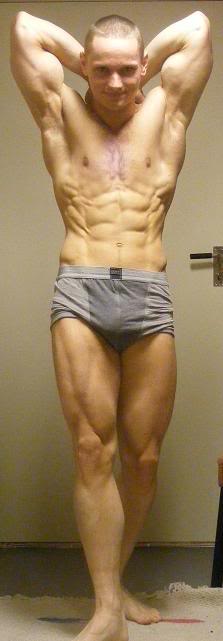Thanks lol.
Last time (2 years ago) I weighed in at 70, not sooo ripped:
I currently actually weigh in on the same weight, in better condition right now than last time. Its amazing how much fat you do have on your body, its often more than you think
A lot of areas on my body have been easier to shed fat (almost effortless) than before. I still do battle with thighs (mostly the backside) and my glutes are the place where I accumulate most fat. I want to at least continue my diet until I can see some definition on my glutes.
Lower ab fat is long gone. The thickness there is as thick as upper ab fat, maybe around 5-8mm on average.
Its been a lot easier to diet this time (I have almost zero mental challenges following my current diet) and I think its because of the following:
* I know how to reduce calories and still provide the right amount of macro and micronutrients to perform and feel well.
* I know how to train without destroying myself during a caloric deficit.
* Green tea
Makes it easier to eat leass calories, can also be used in case you feel low in energy, which of course can happen on a diet sometimes.
* Cardiovascular shape. I made sure I got into it before I started the diet. This means I do some type of cardio at least once a week, year round. On average I do more than once a week though. The good thing about this is that you can tolerate more training (more recovery between workouts, more adapted to do cardio (obviously)) on a calorie restriction AND you will spend more calories when on the threadmill (or whatever equipment you use).
The last part you say about reaching a certain bf% and having trouble losing fat mass without a good amount of muscle too - I find that that bf% is much lower for me this time around. I can probably only guess, but thats what I will do:
* I have different diet habits even when not on a controlled diet.
* I eat more filling and nutritous foods overall, less calorie dense foods low in micronutrients (like candy/chocolate and so on).
*I have taken fish oil regularly for 2½ year which might contribute.
I have experienced a lot with protein intake over the years and I have gone from "dunno how much is optimal" to "ok, high is very important on a diet" to "Hmm, I´m not sure anymore". At the moment I eat around 160g protein/day, which is very low compared to what I did before on a diet. 20-30g of these are EAA/BCAA, which might make up for the "lower" amount.
Why my opinions have changed a lot with regards to protein might be because there could have been other factors (like too much training or too much calorie restriction) that made me get worse results in some months, and not the (relatively) lower protein intake I happened to had in that month.
Still, I am not sure what protein intake is optimal for me on a diet (or a mass phase for that matter, but it probably is lower).
Another interesting thing I could tell you about is Intermittent Fasting. I dont know if you have read about it before but its an eating style very opposite to the traditional style (you know the 6-8 meals approach) of eating to maintain muscle mass and lose fat.
Intermittent Fasting and its said effects has a lot of research to back it up (as well as people making success with it) while the 6-8 meals approach and its said effects (raising metabolism more than few meals, making sure you dont lose muscle because of constant supply) have no backup in science.
Ok there is probably one study that says 6 "meals" are better than 3. This was a study on boxers who dieted on liquid protein. One group got 3 drinks a day and the other got 6. Both groups got the same protein and caloric intake in total. The group with 6 meals maintained more muscle as they lost weight. Try to find studies where real food is used and you will see that there seems to be no difference between few meals and many meals, as long as macronutrients and calories are the same.
Anyway...
IF means you eat your calories around trainign mostly. The "standard approach" is a small meal pre-wo, a huge binge post-wo, and maybe one more meal before bed (to meet the caloric needs). All meals eaten within about 8 hours. Then you sleep and dont eat again for another 16 hours.
I have found that IF makes it easier to diet (for me). It suppresses hunger during the fast (yes, that might be hard to believe if you havent tried this approach before). It enhances mental clarity during the fast, yes probably also very hard to believe, but it does that for many people who have tried it. I perform better when I study (I get MUCH more work done and I dont get "tired in my head" after several hours of thinking) if I dont eat, compared to when I have a steady breakfast.
I havent used IF as the only way of dieting because I have had problems with performing physically when its time for workouts. I have adjusted the portions pre-wo to see if I need a bigger meal, which I seem to do (this has nothing to do with glycogen stores which are filled the day before, its more related with blood pressure and stimulating CNS that might explain why I perform better afer a medium- or larged-sized meal).
That, or it could just be that I am dieting and should accept some performance loss eventually.
Some reading about Intermittent Fasting:
http://avidityfitness.net/2008/01/12/interview-martin-berkhan/
www.leangains.com


